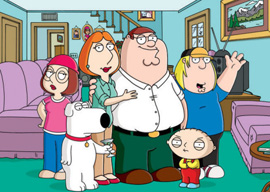
June 16, 2011

Family Guy
South Park: “All About Mormons” (full episode viewable by clicking the link)
Above and beyond all these other shows stands South Park like some majestic peak made of Colorforms, construction paper, and clever commentary. Not since Louis-Ferdinand Céline has vulgarity, humor, and wit so perfectly coalesced. South Park is dependably reliable in delivering meaningful social satire on a regular basis, whether its targets are Muslims, Jews, or illegal immigrants. Its Mormon episode ought to have been titled “A Letter to Christopher Hitchens.” For nearly the entire episode, the Mormon religion is mercilessly pilloried and its adherents met by a soundtrack consisting mostly of “Dumb-Dumb-Dumb-Dumb-Dumb.” That would not qualify it for great art. Yet in the final seconds, the little Mormon boy takes Stan aside and tells him:
Maybe us Mormons do believe in crazy stories that make absolutely no sense, and maybe Joseph Smith did make it all up. But I have a great life and a great family, and I have the Book of Mormon to thank for that. The truth is, I don’t care if Joseph Smith made it all up, because what the Church teaches now is loving your family, being nice and helping people. And even though people in this town might think that’s stupid, I still choose to believe in it. All I ever did was try to be your friend, Stan, but you’re so high and mighty you couldn’t look past my religion and just be my friend back. You’ve got a lot of growing up to do, buddy. Suck my balls.
Are you listening, Hitchens?
Where else are topics such as racial and ethnic stereotypes (and realities) discussed with frequency? Where else to hear that while our own relations with parents may be strained, as adults our responsibility rests in overcoming this and focusing on the next generation? What other programs force us to face our mortality and the universe’s very nature?
What does it say about a nation’s mental capacity that the delivery of well-crafted fiction and shrewd observations can only be injected into the body politic through the most innocuous form imaginable? What sort of satiric societal madhouse can gratify adults’ intellectual needs only through masquerading as children’s programming?
Still, in a time when poetry is obscenity, sculpture is urine in a jar, and music is popcorn for the ears, it is refreshing that acuity still reigns somewhere.
That it occurs in the least likely place of all is perhaps the reason why it remains there.
Lamentably, cartoons may be the most appropriate place for wisdom in a society which otherwise prides itself on conducting its affairs as but a caricature of a civilization.